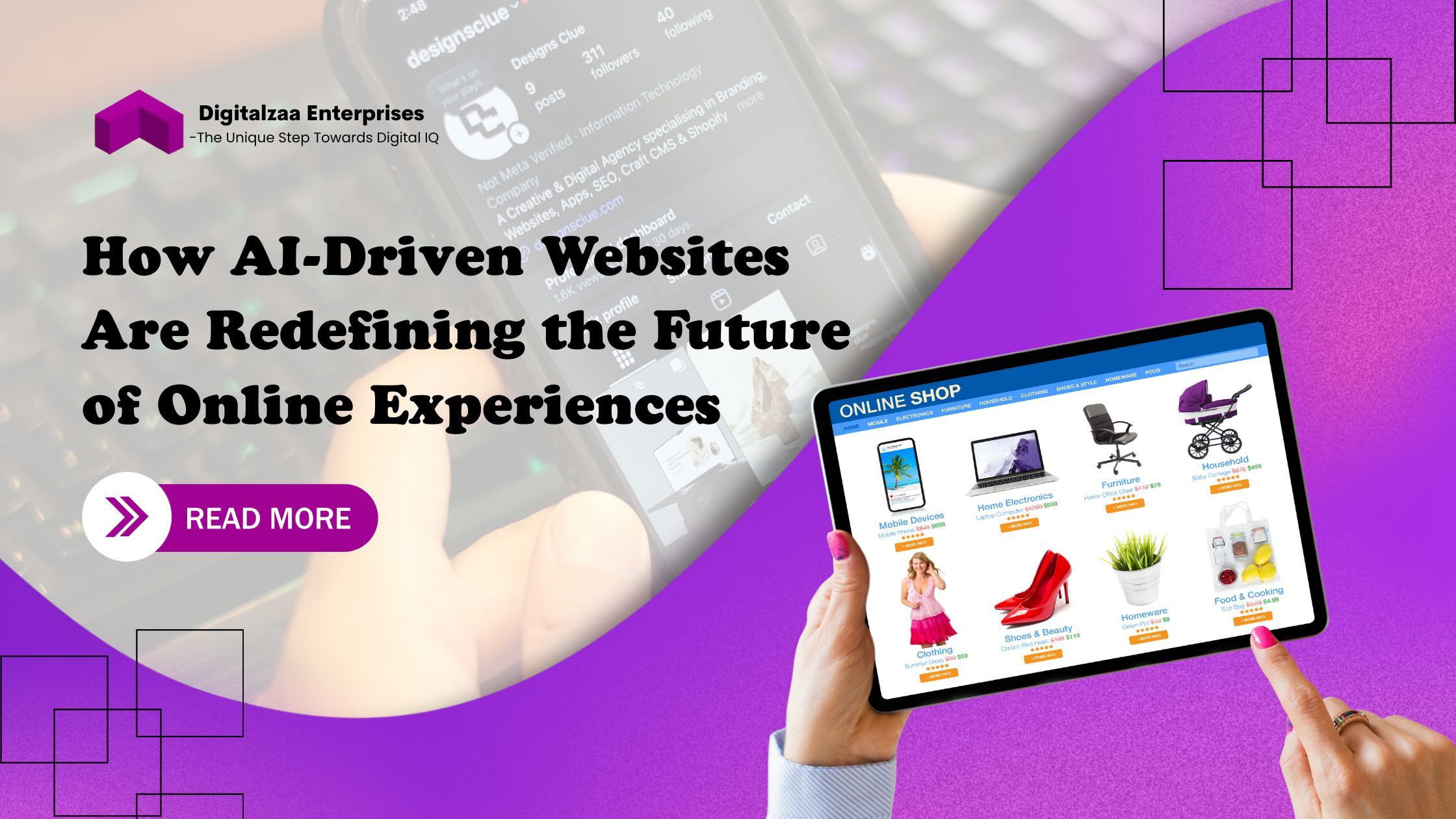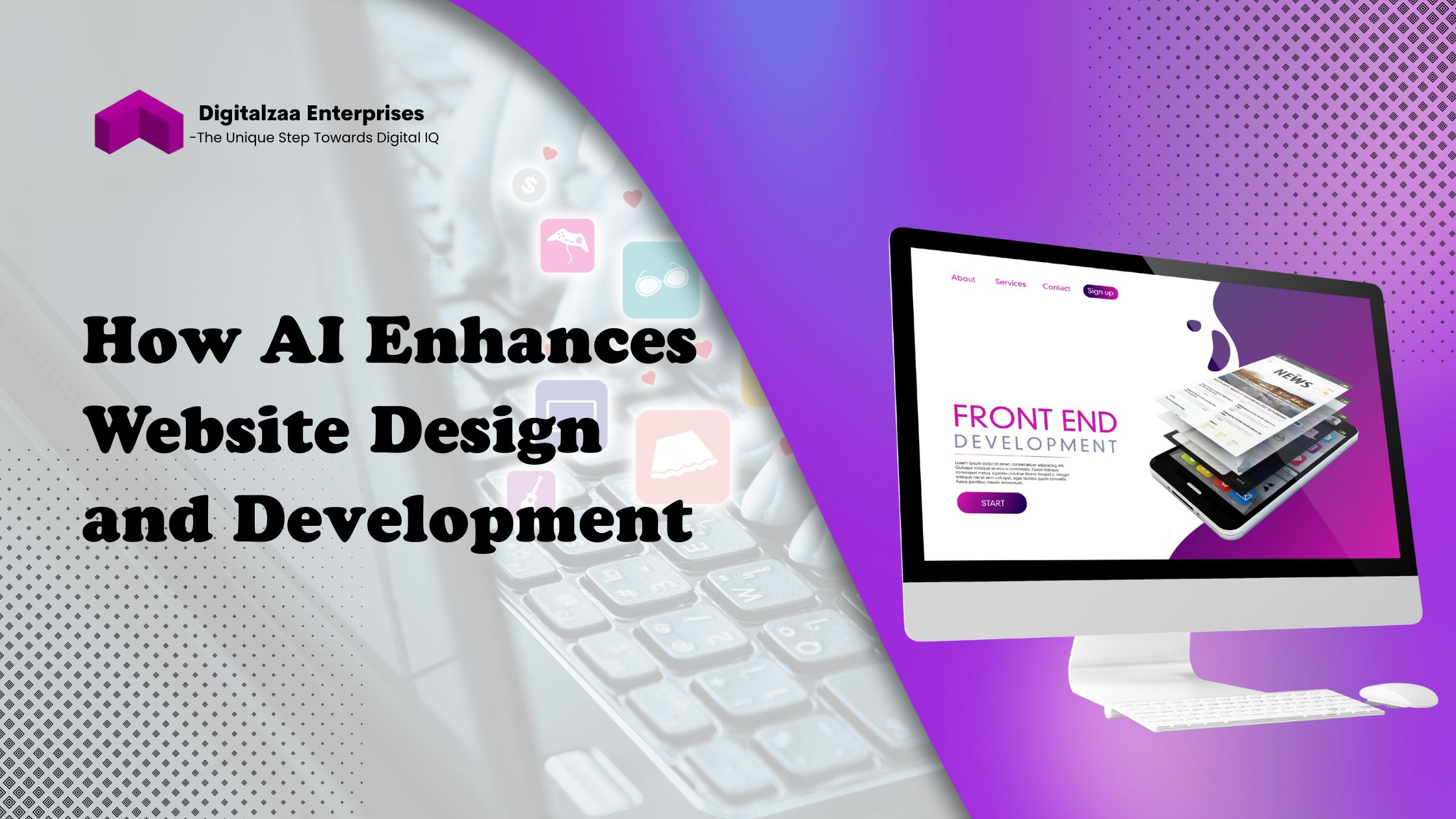How AI-Driven Websites Are Redefining the Future of Online Experiences.

In the fast-paced digital era, user expectations for online experiences are evolving faster than ever. People no longer settle for static, one-size-fits-all websites. Instead, they demand personalization, speed, and intelligent interactions that anticipate their needs. Enter AI-driven websites the transformative force redefining how users interact, shop, and engage online.
From automated design to real-time personalization and predictive analytics, artificial intelligence (AI) is reshaping the future of online experiences in ways that were once unimaginable. Businesses embracing this transformation are not only boosting engagewement and conversions but also setting new standards for digital innovation.
1. Understanding AI-Driven Websites
An AI-driven website uses artificial intelligence, machine learning (ML), and data analytics to optimize every element of the user experience. Unlike traditional websites that rely on static design and manual content updates, AI-powered websites continuously learn from user behavior and adapt in real-time.
These websites can:
- Personalize content based on visitor preferences.
- Optimize layouts using AI-powered A/B testing.
- Use chatbots for 24/7 customer assistance.
- Recommend products or services intelligently.
- Predict user intent to enhance engagement.
Simply put, AI-driven websites are not just digital storefronts—they are intelligent ecosystems that evolve with every interaction.
2. The Rise of Personalized Web Experiences
Personalization has become the cornerstone of digital success. According to research, 80% of users are more likely to make a purchase when a website offers personalized experiences. AI takes personalization to a whole new level.
AI algorithms analyze behavioral data—such as clicks, time on page, purchase history, and location—to tailor the user journey. This creates personalized web experiences that feel intuitive and relevant.
Examples of AI Personalization in Action
- E-commerce: AI recommends products based on previous searches and purchase patterns.
- Media platforms: Streaming services like Netflix or Spotify use AI to suggest content based on user tastes.
- News portals: AI curates news feeds based on reading behavior and interests.
In essence, AI turns a generic website visit into a tailored digital conversation.
3. How AI Enhances Website Design and Development

The evolution of AI-powered website design is changing how businesses build and maintain websites. Previously, web design required manual input, coding, and testing. Now, AI can handle much of the design and optimization process autonomously.
Key Areas Where AI Transforms Web Design
a. Automated Website Creation
AI website builders like Wix ADI or Bookmark use AI algorithms to generate complete websites in minutes. By answering a few questions, businesses can get fully functional, visually appealing, and responsive websites without writing a single line of code.
b. Smart Layout Optimization
AI tools analyze user interactions and heatmaps to determine which layouts drive higher engagement. The system then adjusts elements such as button placement, font size, and navigation menus automatically.
c. Predictive User Interface (UI)
AI anticipates user needs by understanding how visitors interact with pages. This predictive approach ensures the interface remains intuitive, smooth, and user-focused.
d. Enhanced Accessibility
AI can make websites more inclusive by offering real-time language translation, speech recognition, and adaptive content formats for users with disabilities.
By integrating AI-powered website design, businesses can create platforms that are not only aesthetically pleasing but also functionally superior.
4. Revolutionizing Customer Engagement through AI
Customer engagement is at the heart of every successful website. AI-driven websites leverage automation and intelligence to create meaningful interactions at every touchpoint.
a. Conversational Chatbots
Chatbots are one of the most visible applications of AI in web design. Unlike traditional support systems, modern AI chatbots use Natural Language Processing (NLP) to understand context and provide accurate responses. They guide users, recommend solutions, and even complete transactions—instantly improving user satisfaction.
b. Voice Search Optimization
With the rise of virtual assistants like Alexa and Google Assistant, voice search has become a key feature in the future of online experiences. AI enables websites to interpret and respond to voice commands, ensuring a seamless and hands-free browsing experience.
c. Emotion AI
Emotion recognition technology analyzes facial expressions or tone of voice to understand user sentiment. Websites can then adjust responses, colors, or content to suit the visitor’s mood, leading to more empathetic and engaging experiences.
5. Data-Driven Insights and Predictive Analytics
One of AI’s most significant contributions to web development is predictive analytics. By studying historical user data, AI predicts future behaviors and trends, allowing businesses to make proactive decisions.
For example:
- An e-commerce site can predict which products will trend next month.
- A blog can recommend content based on readers’ future interests.
- A SaaS company can anticipate customer churn and intervene early.
AI-driven websites use these insights to refine content strategy, improve conversion rates, and enhance ROI. Data-driven optimization ensures that every visitor encounter contributes to continuous improvement.
6. AI and the Future of SEO
Search Engine Optimization (SEO) is undergoing its own AI revolution. AI tools like Google’s RankBrain and BERT already use machine learning to understand user intent and context better. Websites that adapt AI-driven SEO strategies are achieving higher visibility and engagement.
AI in SEO Enhancements
- Content Optimization: AI analyzes top-performing pages to suggest keywords, readability improvements, and internal linking strategies.
- Voice Search SEO: Optimizing for natural language queries improves ranking for conversational searches.
- AI-Powered Analytics: Platforms like Surfer SEO and Clearscope use AI to suggest real-time SEO improvements.
- Automated Reporting: AI tools automatically track metrics like CTR, bounce rate, and conversions to refine strategies.
In short, AI ensures SEO is no longer guesswork—it’s intelligent, predictive, and precise.
7. The Business Benefits of AI-Driven Websites
Implementing an AI-driven website goes beyond aesthetics—it directly impacts business performance and growth.
a. Enhanced User Experience (UX)
AI analyzes user journeys to eliminate friction points, ensuring faster load times, smoother navigation, and more relevant content.
b. Higher Conversion Rates
Personalized recommendations and intelligent design layouts help convert visitors into customers more effectively.
c. Reduced Operational Costs
AI automates repetitive tasks—like content updates, chat support, and analytics—saving valuable time and resources.
d. Continuous Optimization
AI learns continuously from every user action, meaning the website keeps improving over time without requiring major overhauls.
e. Competitive Advantage
In an era where user attention is fleeting, having a smart, responsive, and engaging website can set a brand apart from its competitors.
8. Real-World Examples of AI-Driven Websites

Many global brands are already leveraging AI to redefine the future of online experiences.
- Amazon: Uses AI algorithms to provide hyper-personalized product recommendations and predictive delivery models.
- Netflix: Employs AI to suggest movies and shows based on viewing habits, improving retention.
- Sephora: Uses AI chatbots for beauty consultations and virtual try-ons.
- The North Face: Uses IBM Watson to recommend jackets based on weather and location data.
These examples show how AI is no longer an emerging trend—it’s a mainstream necessity for businesses aiming for superior online engagement.
9. The Ethical Side of AI in Web Experiences
While AI-driven websites offer immense advantages, they also raise ethical considerations regarding data privacy and transparency.
Businesses must ensure:
- Compliance with GDPR and other privacy regulations.
- Transparent data collection and usage policies.
- Ethical use of personalization to avoid manipulation.
Building trust remains as vital as building intelligence.
10. The Road Ahead: What’s Next for AI-Driven Web Development
The future of AI in web development holds limitless possibilities. We can expect websites that design themselves, content that writes itself, and platforms that adapt to each visitor in milliseconds.
Emerging Trends
- AI-Generated Visuals & Copy: Tools like ChatGPT and DALL·E are already generating high-quality content and images.
- Predictive UX Design: AI will soon be able to preemptively modify design based on user emotions and context.
- Hyper-Personalization: Beyond name-based personalization, websites will deliver experiences tailored to mood, behavior, and even biometric cues.
- Integration with AR/VR: The merger of AI with immersive technologies will redefine digital storytelling and interactivity.
In short, the future of online experiences is dynamic, intelligent, and deeply human-centered—powered by AI.
Conclusion
The rise of AI-driven websites marks a paradigm shift in how businesses approach digital presence and customer engagement. By combining machine learning, predictive analytics, and personalization, AI is crafting web experiences that are faster, smarter, and more responsive than ever before.
Companies that embrace AI-powered website design today are not just keeping up with trends—they are shaping the future of online experiences for the next decade. As technology continues to evolve, one thing is certain: the future of the web belongs to those who think intelligently, design dynamically, and innovate fearlessly.


